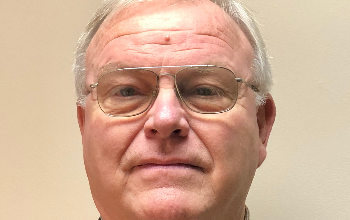President's Perspective

Nay, it’s not easy making (horse) sense of this crazy world
Kentucky School Advocate
January 2020
By Ronnie Holmes
KSBA President
“… It's a crazy world, but I live here and if you can hear me singin' so do you…”
– songwriter Mac MacAnally, from his song “It’s a Crazy World”
It’s years ago, and a little boy talks his mother into letting him ride his stick horse a few blocks into town to buy a candy bar. Upon arrival, he ties the “horse” to a rail, and saunters inside. Ten minutes later, he emerges outside, only to find that his stick horse is gone! He starts to cry. A lady approaches him and asks, “What’s wrong?” Between sobs, he replies, “My stick horse is gone!” The lady says, “It’s not all that bad, really. They’re not expensive. I’m sure your mother will buy you a new stick horse.” The boy gasps long enough between sobs to respond, “Oh, I know that … but now I have to walk all the way home!” The boy lets his make-believe game hide from himself the fact that he provided the legwork all along. He chooses to believe it was an effortless ride.
From the outside, school board work may look as effortless as the boy’s make-believe ride. Although it rarely takes long for a board to vote on an issue in a public meeting, the preparation preceding that vote is a much longer process than the public realizes. Often, board members expend great time and effort before even reaching the point of voting. We would do well to remember those math teachers who insisted that we “show our work.” Why? The math teacher can fix a student’s misunderstanding by seeing where it occurred. In a similar way, the board can give progress reports on issues along the way. Sometimes, we can even solicit public input either during a public meeting, in the media or on social media about the various choices that have emerged on a certain topic. When boards show their work, it allows the community to develop a greater sense of trust in the board. It also increases the public’s understanding and, in turn, helps garner support for the decisions being made.
The Federation Equestre Internationale website records this twist on logic: “A guy walking through the country spots a sign saying, ‘Talking Horse for Sale.’ Intrigued, he walks up to the stable. ‘So, tell me about your life,’ he asks the horse. The horse answers, ‘I was born in the Andes, where I herded for an entire village. Then, I served many years on New York City’s mounted police force. Now, I give free rides to underprivileged kids, here in the country.’ The guy is flabbergasted and asks the owner, ‘Why on earth would you want to get rid of such an incredible animal?’ The owner answers, ‘Because he’s a liar! … He never did any of that!’” The horse’s owner misses the point! It isn’t about the horse’s honesty, it’s that he’s a talking horse!
As board members we need to be conscious of living up to the versions of ourselves we presented during our campaign for election. We can’t forget the motivations and desires to improve our schools that led us to run for school board in the first place.
And that means always being aware of how others, most importantly our constituents, see us.
Reader’s Digest’s tells us another applicable horse story: “A talking horse walks into a bar and asks the manager, “Are you hiring?” The manager looks the horse up and down and responds, “Sorry, pal. Why don’t you try the circus?” The horse snickers, “Why would the circus need a bartender?”
You may see yourself as a dedicated, hardworking board member. But does your community see you engaged in your district, asking thoughtful questions during your meetings or advocating for public education? Have you explained your motivations for serving your community’s children?
Do they see a bartender or a horse?